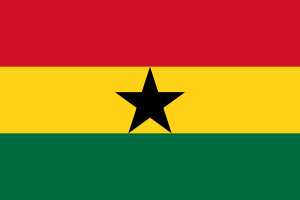 |
| English: Logo of The Intergovernmental Action Group against Money Laundering in West Africa (GIABA) Русский: Логотип Межправительственной группы по борьбе с отмыванием денег в Западной Африке (ГИАБА) (Photo credit: Wikipedia) |
“Ghana and Nigeria are making tremendous progress and
achievement in the fight against money laundering and terrorism financing
(ML/TF)," says the Inter-Governmental Action Group against Money Laundering in
West Africa (GIABA).
On Friday, West Africa’s leading anti-ML/TF said the two
countries have registered remarkable headway in the fight against the twin
crimes that are threatening the economic and social stability of the region.
The GIABA Information Centre in Nigeria, admitted on Feb. 22,
2013, that Ghana has made significant progress in improving its Anti-Money
Laundering and Counter Financing Terrorism (AML/CFT) regime hence the Financial
Action Task Force (FAFT) has excluded the country
from its list of countries with deficiencies in AML/CFT regime.
FAFT, a global standard setting
body for anti-money laundering and combating the financing of terrorism
initially blacklisted Ghana due to the country’s lack of progress in improving
its AML/CFT regime. It also called on member countries to consider the risks
and be cautious in doing any transaction with Ghana.
Hence, the West African country was compelled to “developed an Action
Plan to address the strategic deficiencies identified in its AML/CFT regime”,
with the support of FATF and GIABA, an arm of ECOWAS mandated to clean the
sub-region of the twin crimes.
In October 2010, Ghana made a political commitment to implement
the Action Plan within one year, GIABA said.
 |
| Flag of Ghana (Photo credit: Wikipedia) |
The agency said Ghana in addressing its strategic AML/CFT
deficiencies, established the required legal and regulatory framework to meet
its commitment in the action plan.
This includes the passage of the AML Regulation (LI 1987) by the
Parliament in March 2011; the ratification of the UN Convention against
Transnational Organized Crime (2000) in February 2012; and the enactment of the
Criminal Offences (Amendment) Act 2012.
In January 2013, the International Cooperation Review Group
(ICRG) Regional Review Group (RRG) of the FATF covering Africa and Middle East
conducted an on-site visit to Ghana to ascertain the extent at which measures
are in place to implement the action plan.
GIABA said: “The on-site team was satisfied that five of the
action plan items had been substantially completed, and that there is political
commitment and institutional capacity to implement AML/CFT Reforms in Ghana.”
“The only one item the team considered unsatisfactory was the
inadequacy of the implementation of obligations under the United Nations
Security Council Resolutions (UNSCRs) 1267, 1373, and successor resolutions,”
the Dakar-based sub-regional agency observed.
But Ghana promised the assessment team that this would be met
before the FATF-ICRG meeting scheduled for 18 February 2013 in Paris, France.
At that meeting, Ghana proved beyond reasonable doubt that this
requirement had been met and presented in evidence Executive Instrument
entitled “Instructions for the Implementation of the UNSCRs 1267 (1999), 1373
(2001), 1718 (2006), 1737 (2006), Successor Resolutions and Other Relevant
Resolutions” issued by the unconsolidated list of individual terrorists,
entities or organizations dated 14 February 2013.
On February 20, 2013, FATF welcomed
Ghana’s significant progress in improving its AML/CFT regime and noted that
Ghana has established the legal and regulatory framework to meet its
commitments in its action plan.
FATF concluded that Ghana is
therefore no longer subject to its (FATF’s) monitoring process under its
on-going global AML/CFT compliance process.
Ghana will work with GIABA as it
continues to address the full range of issues identified in its Mutual
Evaluation Report.
Nigeria’s significant efforts
 |
| Flag of Nigeria (Photo credit: Wikipedia) |
GIABA said Nigeria has also made
significant efforts and taken steps towards improving its AML/CFT regime,
including criminalisation of the full range of predicate offences for money
laundering and the passage of the Money Laundering (Prohibition) (Amendment)
ACT 2012; and most recently on 21 February 2013, President Goodluck Jonathan
assented to the Terrorism (Prevention) (Amendment) Act 2013.
The enactment of the Anti-Terrorism
Act marks a turning point in the implementation of a robust counter terrorism
measures in Nigeria, which is a major requirement for an effective AML/CFT system,
GIABA said.
While FATF is yet to assess the
legislation due to the very recent nature of its enactment, GIABA encourages
Nigeria to remain resolute and continue with the implementation of its action
plan.
Positive developments
The sub-regional economic bloc’s
AML/CFT watchdog, GIABA, welcomes “these positive developments” in its two
member states, especially the very strong commitment and relentless efforts to
pass the required pieces of legislation and enforce a full range of regulatory
framework.
With specific mention to Ghana,
GIABA congratulates the country for exiting the monitoring process of the FATF.
It also commends Nigeria for its commitment and relentless efforts to get out
of the process as soon as possible.
The agency also re-assured its members
that it will continue to provide them with the necessary guidance, technical
support and assistance to ensure that none of its members is subjected to the
FATF review.
Written by Modou S. Joof
Follow on Facebook: The-North-Bank-Evening-Standard











No comments:
Post a Comment
The views expressed in this section are the authors' own. It does not represent The North Bank Evening Standard (TNBES)'s editorial policy. Also, TNBES is not responsible for content on external links.